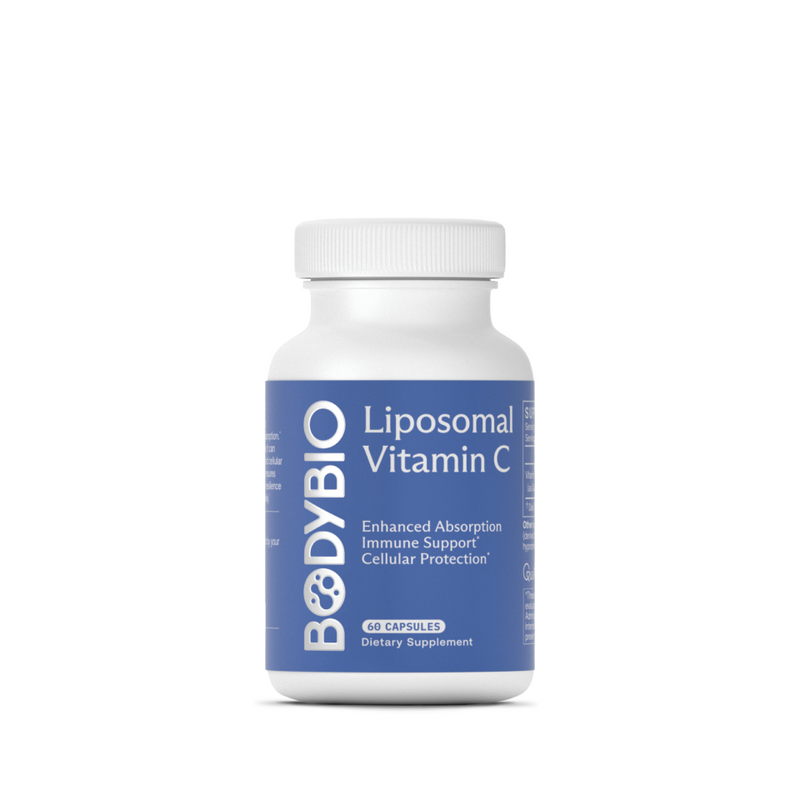What Vitamins Should Not Be Taken Together? Understanding Vitamin Safety & Absorption
Authors:

Dr. Thomas Wnorowski
PhD, CNCC Research Director, BodyBio & Biomedical Nutritionist
Key Takeaways:
Key Points:
- Vitamins don’t typically interact with one another (unlike drug interactions that you might experience from pharmaceuticals) so there aren’t a lot of vitamins you shouldn’t take together. Still, it’s important to be aware of what vitamins might increase or decrease the absorption and bioavailability of others.
- Some vitamins compete with others for absorption in the body. If this is the case, we recommend you take them a few hours apart from each other.
- When considering supplement safety, it’s important to pay attention to fat-soluble vitamins (those that are stored in the body rather than excreted through urine). Taking excess amounts of these vitamins can cause toxicity.
True or false: combining the wrong vitamins may increase your risk of various health concerns.
The answer? It’s mostly false.
Vitamins are extremely safe — and they wouldn’t be readily available on drugstore shelves if they weren’t. However, it is worth noting that some vitamins can interact with each other, competing for absorption in the body.
When it comes to vitamin and supplement safety, the primary thing you want to look at is balance. A vitamin or mineral deficiency could set your body off-balance, and so can the overuse of certain vitamin supplements. Oh, and have we mentioned vitamin quality? That plays a huge role in your body’s response to supplements, too.
In this blog, we’re sharing everything you need to know about vitamin interactions — specifically, what vitamins should not be taken together.
Table of Contents:
- What Supplements Should Not Be Taken Together?
- What Vitamins Should Not be Taken Together Chart
- Are Supplements Safe?
- Fat Soluble Vitamins vs. Water Soluble Vitamins
- Should I Take a Multivitamin?
- Increase Nutrient Absorption with Liposomal Vitamin C
What Supplements Should Not Be Taken Together?
Many patients are familiar with the dangerous side effects that may occur when pharmaceutical drugs are combined with other substances (alcohol, for example).
This isn’t generally the case with vitamins. When taken together, most vitamins are safe. They won’t cause any kind of adverse reaction when combined. But it’s important to remember that despite the lack of side effects, vitamins and minerals often compete with each other for absorption. Over time, an imbalance can occur.
B12 and Vitamin C
Taking vitamin B12 with your vitamin C is an easy mistake to make. In most cases, vitamin C actually increases the absorption of other vitamins, so it's usually encouraged alongside your daily supplements. But this isn’t the case for vitamin B12.
A large dose of vitamin C can hinder the absorption and metabolism of vitamin B12 in the body. This doesn’t mean you can’t include both vitamins in your supplement routine — but we do recommend spacing them out by a few hours. For example: You can take vitamin C in the morning and vitamin B12 at lunchtime (or vice versa).
Zinc and Copper
Here’s the thing about zinc. While it’s an incredible mineral that benefits the thyroid, immune system, and reproductive system, it can also deplete your copper levels. If you are taking zinc long-term, then you absolutely should be taking a copper supplement, too. Many supplements combine these two minerals to keep them in balance, but they are best taken separately for maximum absorption.
When it comes to supplementing with zinc or copper, the main objective is to create a clear balance between the two. Typically, an 8:1 zinc-to-copper ratio is recommended to prevent one from depleting the other.
Calcium and Magnesium
Calcium is doing big things in the body: encouraging bone health, regulating heart rhythm, and balancing muscle contractions. But it’s also taking up a lot of space. Calcium competes against magnesium, iron, and zinc in the body — and it usually wins. This is why high calcium supplements or high calcium diets can leave patients with deficiencies in iron, magnesium, and zinc.
Most people don’t need to take a calcium supplement — since calcium is readily available in dairy products, veggies, and even fish. However, if you do need to take one, just space it out from your other minerals. Try not to eat a calcium-rich meal before taking magnesium, either.
Bonus: Use Caution with St. John’s Wort
St. John’s wort is a popular herbal remedy that’s known to help with insomnia, pain management, and depression. For some, it’s incredibly effective and may hold off more risky solutions (like pharmaceuticals). But it’s important to remember that St. John’s wort is infamous for its drug interactions.
Although it’s usually safe to take with other vitamins and minerals, this powerful herbal supplement may interact with pharmaceutical medications like birth control, antidepressants, SSRIs, chemotherapy, immunosuppressants, antibiotics, and more — usually rendering these drugs less effective.
What Vitamins Should Not be Taken Together Chart
We’ve covered the basics, but here’s a quick reference: our easy-to-use chart of vitamins you shouldn’t take together.
|
Supplement |
Benefits |
What You Shouldn’t Take It With |
What You Should Take It With |
|
Calcium |
Bone health, heart rate regulation, muscle contractions, and nerve function |
Magnesium, iron, and zinc |
Vitamin D (for better absorption) |
|
Zinc |
Skin health, reproductive system health, thyroid health, and immune system function |
Vitamin C (for increased immune system support) |
|
|
Vitamin C |
Immune system function and powerful antioxidant. |
Vitamin B12 |
Zinc, vitamin E, vitamin D, and iron (if you’re deficient) |
If you’re taking prescription medication and experiencing severe vitamin or mineral deficiencies, it may be helpful to look into drug-induced nutrient depletion. Medications like SSRIs, cholesterol-lowering drugs, contraceptives, binders, antibiotics, and antacids all have potential side effects, including stripping your body of essential vitamins and minerals.
Are Supplements Safe?
What’s most concerning to us when it comes to supplement safety isn’t the combination of vitamins in your morning routine. It’s the quality of vitamins you’re consuming. The FDA does regulate dietary supplements, but it doesn’t approve them. This means that vitamins sold at pharmacies and grocery stores don’t have to go through any testing or approval processes before they’re put on shelves.
In one study, high levels of lead, arsenic, and aluminum were found in grocery store supplements. These are dangerous heavy metals that absolutely shouldn’t be in your body. It’s also common for supplement companies to make false claims about the effectiveness of their products.
Here are some tips you can use to select a high-quality vitamin brand:
- Make sure research is a priority. Any vitamin company that isn’t doing its research doesn’t have enough credibility to provide vitamins and supplements to you and your family.
- Don’t use grocery store brands. Honestly, they’re full of sugar, fillers, and usually aren’t bioavailable.
- Ask your functional medicine practitioner. Especially if you’re taking supplements for detox, your functional medicine practitioner should be involved in the process. Most likely, they can recommend high-quality supplement brands they trust.
Fat-Soluble Vitamins vs. Water-Soluble Vitamins
When discussing what vitamins should not be taken together, it’s important to consider fat-soluble vitamins vs. water-soluble vitamins.
Fat-soluble vitamins are those that are stored in fat and tissue when consumed in excess. Usually, this is a good thing — your body is storing what it doesn’t need right now to use at a later time. Vitamins A, D, E, and K are all considered fat soluble.
Extra care should be taken with fat-soluble vitamins, since a high dose (or many high doses) is more likely to cause symptoms of toxicity. When your body gets overloaded with fat-soluble vitamins, it can even cause damage to vital organs (particularly the kidneys and liver).
Water-soluble vitamins are those that are excreted through the urine. Say you take a higher dose of vitamin C, and your body determines it doesn’t need it all. The excess will easily be eliminated from the body and considered waste. That’s why it’s safer to take a high dose of vitamin C (water-soluble) versus a high dose of vitamin A (fat-soluble).
Should I Take a Multivitamin?
No, we really don’t recommend multivitamins. They are prime candidates for excess additives, toxic oils, fillers, and more. And usually, they don’t make much of a difference in your overall nutritional status, especially if you have significant deficiencies to correct.
Instead, we recommend focusing on nutrition as your main source of vitamins and minerals. If you have symptoms of a vitamin deficiency or if you have a chronic illness that could deplete nutrient stores and interfere with vitamin absorption (gut dysbiosis, specifically), we recommend working with a functional medicine practitioner who can create a customized supplement protocol that is unique to your own health and wellness goals.
Addressing specific vitamin deficiencies is a much healthier long-term solution than guessing your needs with a multivitamin.
Increase Nutrient Absorption with Liposomal Vitamin C
Vitamin C is a powerhouse antioxidant that’s known for its ability to increase the absorption of other vitamins and minerals. If you’re extremely deficient in iron, for example, taking vitamin C and iron together is a great way to boost your iron levels.
BodyBio’s vitamin C is liposomal (readily available for the body to use), and tested for GMOs and glyphosate. It helps to eliminate free radicals, protecting your body on a cellular level while also enhancing the absorption of other nutrients.
Health Encyclopedia - University of Rochester Medical Center: Garilli, B., Southard, C., & Wojcik, S. (n.d.). Vitamin C. https://www.urmc.rochester.edu/encyclopedia/content.aspx?contenttypeid=19&contentid=vitaminc
National Research Council (US) Committee on Diet and Health. Diet and Health: Implications for Reducing Chronic Disease Risk. Washington (DC): National Academies Press (US); 1989. 11, Fat-Soluble Vitamins. https://www.ncbi.nlm.nih.gov/books/NBK218749/
Toxic Element Contamination of Natural Health Products and Pharmaceutical Preparations: Genuis SJ, Schwalfenberg G, Siy AKJ, Rodushkin I (2012) Toxic Element Contamination of Natural Health Products and Pharmaceutical Preparations. PLOS ONE 7(11): e49676. https://doi.org/10.1371/journal.pone.0049676
Vannucchi H. (1991). Interaction of vitamins and minerals. Archivos latinoamericanos de nutricion, 41(1), 9–18.
Brzozowska A. (1989). Interakcje zelaza, cynku i miedzi w organizmie zwierzat i człowieka [Interaction of iron, zinc and copper in the body of animals and humans]. Roczniki Panstwowego Zakladu Higieny, 40(4-6), 302–312.
Watson, W. S., Vallance, B. D., Muir, M. M., & Hume, R. (1982). The effect of megadose ascorbic acid ingestion on the absorption and retention of vitamin B12 in man. Scottish medical journal, 27(3), 240–243. https://doi.org/10.1177/003693308202700309

